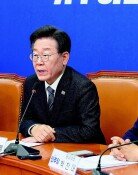North Korean, U.S. Envoys May Meet
North Korea and the U.S. may have bilateral talks in Beijing around November 28 to reopen the six-party talks.
Christopher Hill, the Assistant Secretary of State for East Asian and Pacific Affairs and head of the U.S. delegation, and Kim Gye Gwan, the vice foreign minister of North Korea and head of the North Korean delegation, will visit Beijing on November 27 and 28, respectively. Since November last year when the six-party talks came to a halt, there has been one bilateral meeting of the delegation heads between North Korea and the U.S. which took place on October 31 when North Korea decided to return to the talks.
Since North Korea has decided to return to the six-party talks, the bilateral meeting between Vice Foreign Minister Kim and Assistant Secretary Hill will stay within the frame of the talks, said a government official on November 26. There is no reason Assistant Secretary Hill cannot see Vice Foreign Minister Kim.
A Washington diplomatic source said, Vice Foreign Minister Kim and Assistant Secretary Hill had a plan to see each other on November 20 in Beijing hosted by the Chinese government, but Vice Foreign Minister Kim put it off, saying he was not feeling well.
At the same time, South Korea, China, Japan and participants of the six-party talks plan to hold bilateral meetings actively early this week in Beijing.
South Korean chief delegate for the six-party talks Cheon Yeong-woo, chief negotiator for Peace in the Korean Peninsula under the Ministry of Foreign Affairs and Trade, will visit Beijing on November 27 and meet with the Chinese delegate Wu Dawei, vice-minister of Foreign Affairs. Japanese delegate Sasae Kenichiro, director general of the Asia and Oceanian Affairs Bureau of the Japanese Foreign Ministry, arrived at Beijing on Nov. 26.
Russian delegate Alexander Alexeyev, deputy foreign minister, is known to be unable to participate in this gathering due to his bad health.
Some predict that the next six-party talks, anticipated to take place in mid December, can be postponed to next year in case North Korea and the U.S. fail to come to an agreement in the bilateral contact.
It is expected that North Korea, during the six-party talks, will not withdraw the principle that the U.S should first unfreeze North Koreas account at Banco Delta Asia (BDA) of Macao. The South Korean government thinks it is more probable that the U.S. will turn down this request and urge North Korea to freeze its nuclear arms first.
It is hard to expect that the U.S. will take an epochal measure in the six-party talks such as unfreezing the accounts, said a government official.
Accordingly, Korea, China, the U.S. and Japan judge that a failure between North Korea and the U.S. to find an agreeable point in this bilateral contact will make it necessary to wait longer while the two narrow down the division in their opinions.
The failure of the six-party talks to be held after the nuclear test by North Korea will be nothing like that in the past, said a government official. He predicted, If North Korea does not take measures to express its will to abolish nuclear arms in spite of the six-party talks being held, the future of the talks will be very dark.
He said that postponing the six-party talks could be preferable to a situation where credibility of North Korea falls drastically.
gun43@donga.com srkim@donga.com







